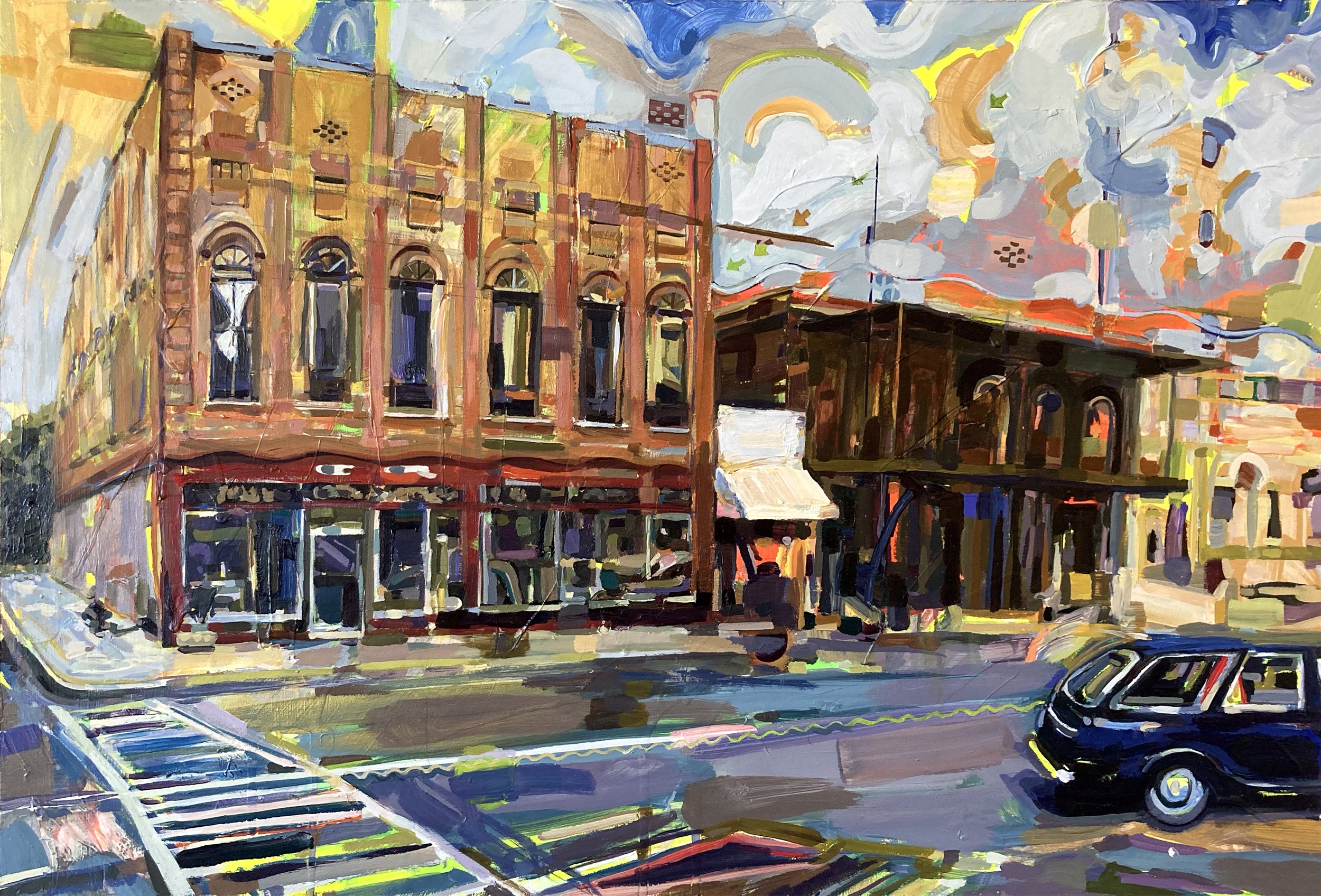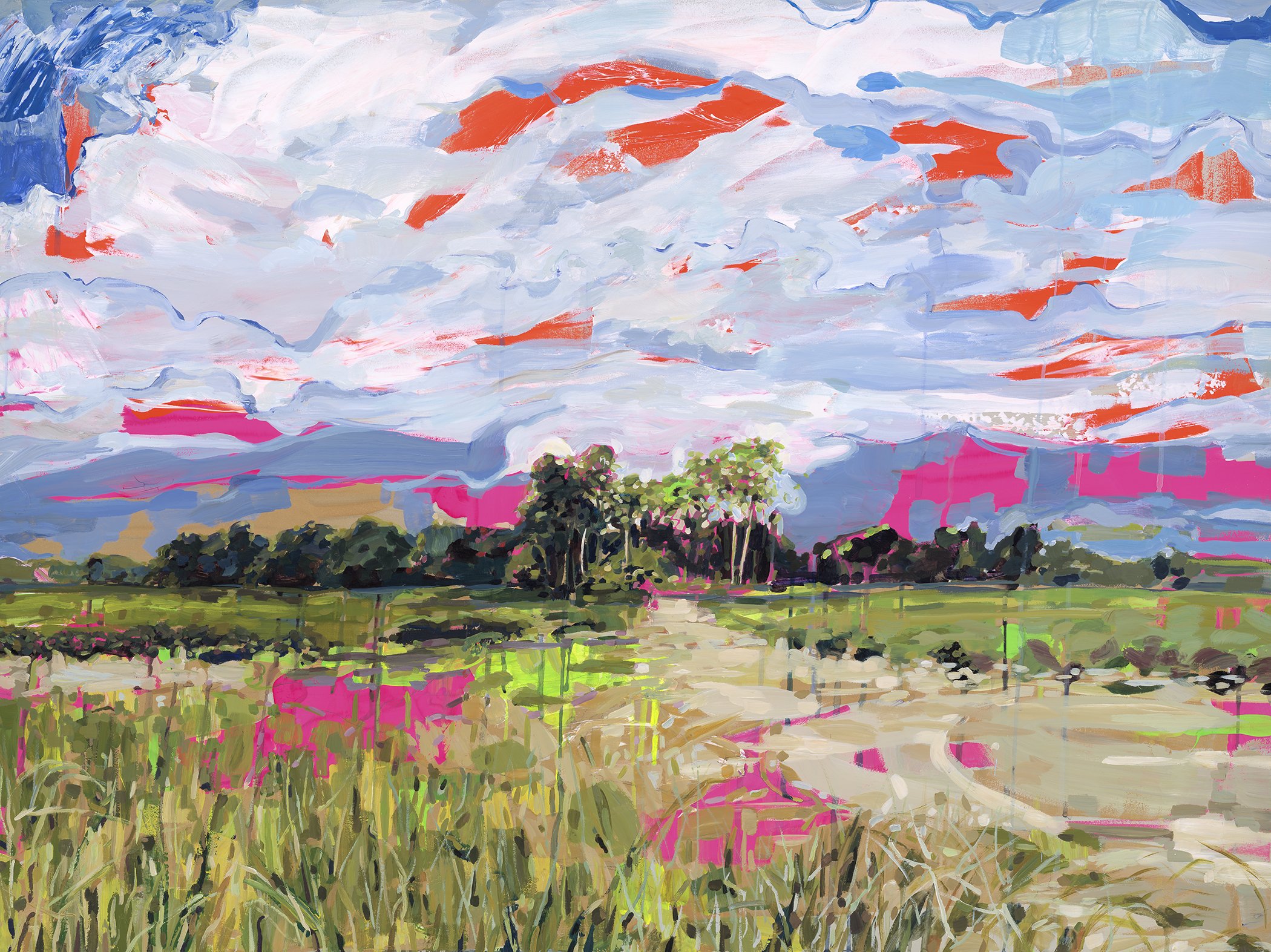
Water Valley, Mississippi
Located 20 miles from Oxford, Mississippi, in nearby Yalobusha County, Water Valley (pop. 3325) got its start in the 1800’s as a railroad stop for the Illinois Central Railroad. In 1931, Water Valley hosted its very first Watermelon Carnival, which is still the biggest community event each year. By 1982, the railroad was abandoned and the depot was transformed into the Casey Jones Railroad Museum. In the last decade, Water Valley has been home to one the first craft breweries in the state, Fat Possum Records, Violet Valley Bookstore (to date Mississippi’s only queer feminist bookstore), and Base Camp Coding, a free, non-profit software development academy for Mississippi high-school seniors.

Open to Change
What is it about Water Valley that has attracted such new, creative industry? I wanted to know more, and as luck would have it, I was fortunate enough to meet Beth Mayeaux and Robbie Fisher, relatively new residents themselves, via social media. Beth and Robbie invited me to their home (pre-COVID), where I was equally fortunate enough to meet folks from literally all over the country who had moved to Water Valley in the last few years.
I met alums of Teach for America who has stayed put and were raising families and running for office; I met people who worked in Oxford but, for a whole host of reasons, weren’t keen on living there; I met more than one retiree from New York; I met artists who moved to Water Valley so they could buy a home and a studio space. The list goes on.
Naturally, I had a million questions: Why? Why did they move to Mississippi? What was it about Water Valley that kept them there? Here's some of what folks told me:
Water Valley is changing, and is open to change. Remember, this community is/was home to one of the Mississippi's first craft breweries, its only LBGTQ bookstore, Base Camp Coding Academy, and to Fat Possum Records.
There's a sense that newcomers are respectful of, and listen to, long-time residents, which makes those folks more open to incremental change.
The low cost of living in small-town Mississippi (and I would image the community "openness") encourages folks to try new ventures and not be totally terrified of failure.

A few months later on a return trip, I connected with Dixie Scovel, a former New York newspaper reporter, editor, and head of PR who up and moved to Water Valley in 2017, ten years into retirement. Her column about this experience appeared in the local North Mississippi Herald for a few years, and she cites this time at the Herald as enabling her to get to know her new community better.
I visited Dixie in her home in mid-August, that time of year in Mississippi that is typically hot as blazes (as my mama would say). I wanted to know why, ten years into retirement, she moved from Long Island to Mississippi. What were those things that had both pulled her and kept her there?

The Hills Stayed Green
Dixie mentioned two things: the landscape and the language. She describes her pull towards the Mississippi terrain:
“In my own experience, I've always loved nature. I love the fields. I love the farms. When I came here, I expected reading about the heat, that the summer would come and everything would turn brown and all the leaves would come off and I would be living in a desert. And it was such a great surprise that here, the hills stayed green. The trees stayed green. And I loved that part of the landscape, and I loved watching the farms. I loved watching the cotton. I love driving along the road after they've picked, and there are wisps of it on the telephone poles, and on the weeds along the road.”

“The whole landscape of it, I love. And the clouds. I'm driving towards Oxford, and it's a very blue sky, and all the cumulus clouds just sort of rise up in the horizon. So there is a beauty to it that I didn't expect.
It reminds me I was born in western Pennsylvania, and there are times in the winter when I drive through here and the fields are brown. It looks exactly like Western Pennsylvania. The hills there are more rugged, but it's similar. I went to grade school and high school in upstate New York, and it is similar to that also. We had the lakes. All of that beauty is here. It's a little different. The sky's different on Long Island. We had more gray and lighter blue. But, all of that beauty is here and I appreciate it.”

I Could Live in This Room
Before moving was ever on her radar, Dixie had taken a road trip through Mississippi: from Jackson to Natchez, north through the Delta, east to Oxford, and south back to Jackson. It was in Oxford where she stumbled into Square Books, a local, independent bookstore. She describes the experience that so many of us have when we walk into a really great bookstore for the first time.
“And I went to Square Books, and I went up to the second floor, and I loved the prints. And I looked around, and I didn't know so many of those books by black writers, Southern writers. And I just sort of looked around at all of those books that I had never read. And they had great coffee. And I got great coffee, and I sat down and started to read. And I looked up, and hours had gone by.
And my thought was, ‘I could live in this room. I could just live here and be very happy.’ It was just a passing kind of thought. And I went to Faulkner's house and I just wandered around Oxford and did those things, and then got in the car and drove back to Jackson and got on a plane and went home. But the experience of not so much Oxford as the bookstore just stayed with me.”
A combination of factors inspired Dixie to move to Mississippi after the 2016 election: a desire to escape New York winters; a choice to move from the trappings of homeownership to the benefits of renting a home; and curiosity about the cultural and political chasms between the Northern elite and the South that became wider surrounding the election.
“And so there was a real curiosity that was starting. And my own belief that if I were to have any understanding, I have to live in it… And I just happened to remember the bookstore. And I thought, ‘What would be like...?’”

You can find The B.T.C. Grocery right on Water Valley’s Main Street. And from the outsider perspective, this grocery/restaurant/vintage shop, which stands for Be the Change and that’s been serving the community since 2010, is geographically and culturally one of the centers of town. Killer food, open minds, no pretension. According to their website and awesome cookbook that I happily own (which they say is the only cookbook you can find at both Cracker Barrel and Anthropologie):
“The B.T.C. was the daydream of Alexe van Beuren, a Viriginian transplant to the small town of Water Valley, Mississippi. Inspired by the possibilities of the historic brick building her husband, Kagan Coughlin, had bought and single-handedly rescued, Alexe decided to combine her love of food, story, and place into a store like no other. A place where women in church hats and men off of trucks would mingle and where there’s a playhouse just for children.”
(Incidentally, The B.T.C. Grocery featured strongly in a New York Times article about Water Valley.)
I’ve eaten there a couple of times - once with new friends Dixie, Robbie, and Beth and once with my folks. But the first time I ever set foot inside The B.T.C. was en route to our wedding back in 2017. Aaron and I stopped, drawn in by the watermelons out front. We walked in and I immediately set eyes on (and bought) an antique cross-stitch reading “May the Lord Bless You and Keep You.” We are not religious folk too much, but this seemed like a good omen, and now it’s a lovely memory.

The Church of the Nativity is a tiny, 100-year-old, Episcopal mission church right in downtown Water Valley. You can't miss the Blessing Box out front, a teeny miniature of the church with a sign on the side that reads: "Blessing Box. Love God, Love Others, Serve the World. Take What You Need, Give What You Can." Inside you can find nonperishable food, household items, and contact information for the Yalobusha County Health Clinic to receive more assistance and personal care items.
Like what you see? Invest in a painting or a print of Water Valley.
I invite you to watch this short video that filmmakers Bruce James Bales and John Hennessey Baker created of me chatting about I Could Live in this Room.